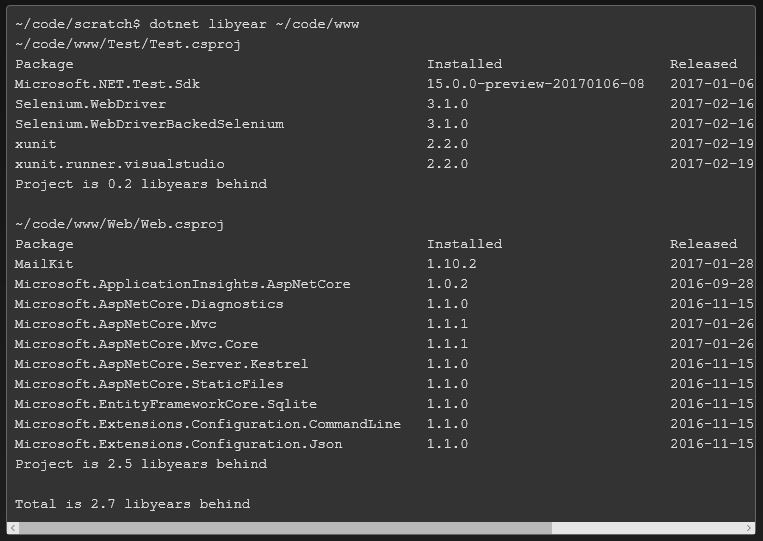.NET Core continues to move forward at a rapid pace; this includes not only the framework but also the knowledge and tools related to it. Here are three recent highlights:
LibYear, a "dotnet CLI tool for managing dependency freshness"
Quicklink: https://stevedesmond.ca/blog/happy-libyear
LibYear (blog post here), written by Steve Desmond, uses your .csproj or project.json file as input and compares it to NuGet.org, producing a list of your dependencies and their freshness. That is, it checks to see if a dependency is current or a previous release, and calculates the age of any downlevel assemblies. It the adds up the ages and produces the age of your libraries in a year, hence "LibYear". Here's an example (from Steve's blog post):

The code is on Github. This is a great example of a .NET Core open source community member giving back. Thanks, Steve.
LocalAppVeyor: Run your AppVeyor builds, locally
Quicklink: https://github.com/joaope/LocalAppVeyor
AppVeyor (www.AppVeyor.com) is a popular online CI/CD tool for .NET applications. In this open source code, João Correia (github: joaope) has created a utility, which allows you to use your appveyor.yml file to produce local builds. This works on all three .NET Core platforms; Windows, macOX, and Linux. Because it's local to your machine, some (very few) AppVeyor build steps are not supported. The best part of that last sentence? It means you have the opportunity to fork the LocalAppVeyor github repo and add whatever steps are possible. This is the essence of open source. Thanks, João.
Clean Up CSPROJ
Quicklink: http://rehansaeed.com/cleaning-up-csproj/
Muhammad Rehan Saeed's blog is a fountain of knowledge, and this post is great for three reasons:
- It helps you clean up your
.CSPROJfile - It helps you better understand your
.CSPROJfile - The cover picture was taken in Dubai, the Burj Khalifa building is in the background, and I'm pretty sure some software I wrote helped build it.
This isn't software; rather, it's an instructional blog post about the .CSPROJ file that is created after you run dotnet migrate, and how to clean it up. Again, the biggest gain -- in my opinion -- is the understanding you gain.
While you're at his blog, you'll probably end up spending a lot of time, as I did, just taking in all the great content. Well done, Muhammad.
Looking Forward
This blog post will be a regular feature and part of the .NET Core community. Stay tuned; we're (all) just getting started.
For additional information and articles on .NET Core visit our .NET Core web page for more on this topic.
